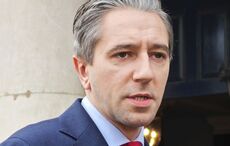Ireland’s Taoiseach (Prime Minister) Garret FitzGerald made an impassioned appeal to the UK Prime Minister Margaret Thatcher, in 1985, to save the talks on the future of Northern Ireland. He warned that failure could “provoke a civil war which would drag the Republic down.”
Evidence of the Irish leader’s pleas has emerged among files released by the British National Archives, at Kew. FitzGerald called for more “confidence-building measures,” especially in relation to the reform of the police and security forces. He believed this was essential to selling the agreement to the minority nationalist population in the North.
On June 29, 1985 FitzGerald and Thatcher met in on the margins of a European summit in Milan. The Anglo-Irish Agreement talks were at their climax and the two leaders met to assess the progress.
The meeting recorded by Thatcher’s foreign affairs adviser Charles Powell took place at Castello Sforzesco over late-night whiskeys.
According to Powell, FitzGerald spoke “with considerable emotion.”
He said he was regarded as “eccentric” in Ireland because of the amount of time and effort he had devoted to finding an agreement, which allowed Ireland to have an advisory role on the future of Northern Ireland.
The minute noted, “He was the only person willing to take the risks and force the Irish people to face up to the need for an agreement. He did so because he believed that otherwise Sinn Féin would gain the upper hand amongst the minority in the North, and provoke a civil war which would drag the Republic down.”
“There were people on the sidelines like Colonel Gaddafi ready to put up millions of pounds to achieve this aim. For 800 years Britain had occupied Ireland to protect its flank. All he wanted were minimal steps to protect the minority.”
Thatcher reassured FitzGerald that she shared his determination to prevent Ireland coming under “hostile and tyrannical forces” and understood the need for “visible measures” to demonstrate to nationalists that the agreement was being implemented “from the very first day.”
This agreement was signed at Hillsborough Castle on November 15, 1985.
The files released from the British Archives show that Britain’s government had underestimated the opposition they would face from Unionists.
Northern Ireland secretary Douglas Hurd suggested at the time there might be some disorder but that it would be manageable. He had met with Ulster Unionist leader James Molyneaux and Democratic Unionist Ian Paisley.
He wrote, “The unionist reactions were no more than to be expected. Dr Paisley was vehement in his denunciation of the negotiations; but the apocalyptic vision and rhetoric of betrayal and backlash are his regular stock in trade."
“He did not walk out of my meeting and summon a press conference to denounce the Anglo-Irish talks, still less call his followers out on the streets in protest. I do not think that he will take active steps to try to stop the negotiations, though he will no doubt continue to denounce them.”
Hurd had not envisioned the protests, mass rallies, demonstrations, and political boycotts which followed.




Comments